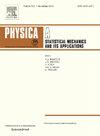Nature-inspired design principles promote supply network resilience
IF 2.8
3区 物理与天体物理
Q2 PHYSICS, MULTIDISCIPLINARY
Physica A: Statistical Mechanics and its Applications
Pub Date : 2024-10-01
DOI:10.1016/j.physa.2024.130133
引用次数: 0
Abstract
The dynamic, interconnected nature of modern supply chains makes it important to understand how firm-level decision-making will impact the robustness of supply chains to disruption. The behavior of naturally evolved distribution systems offers a useful starting point to identify potential design features that can promote robustness without compromising the viability of individual firms. Drawing inspiration from how ant food-sharing networks respond to supply shortages, we developed an agent-based model of a generalized supply network and evaluated how different local strategies influenced the ability of firms to acquire sufficient resources to meet their demand. Our simulations reveal that differences among firms in strategic behavior can reduce variation in outcomes across firms while maintaining mean performance, thereby buffering system-level robustness. In addition, the ability to expand one’s supplier network bolstered performance when firms experienced difficulty in meeting their demand. Conversely, under the assumptions of our model, overly relying on distributors to gain access to additional suppliers or to gain competitive advantages was ineffective in helping firms to meet their consumptive demand. Our nature-inspired modeling framework provides a potentially useful approach for evaluating how different participant decision-making strategies may impact the robustness and resilience of global supply chains that are increasingly likely to face frequent and unpredictable disruptions.
自然启发设计原则促进供应网络的复原力
现代供应链具有动态、相互关联的性质,因此,了解公司层面的决策将如何影响供应链的抗干扰能力非常重要。自然演化的分销系统的行为为我们提供了一个有用的起点,以确定潜在的设计特征,从而在不损害单个企业生存能力的情况下提高稳健性。从蚂蚁食物共享网络如何应对供应短缺中汲取灵感,我们开发了一个基于代理的广义供应网络模型,并评估了不同的本地策略如何影响企业获取足够资源以满足需求的能力。我们的模拟结果表明,企业间战略行为的差异可以减少企业间结果的差异,同时保持平均绩效,从而缓冲系统层面的稳健性。此外,当企业在满足需求方面遇到困难时,扩大供应商网络的能力也会提高绩效。相反,在我们的模型假设下,过度依赖分销商来获得更多供应商或竞争优势,并不能有效帮助企业满足其消费需求。我们的自然启发建模框架为评估不同参与者的决策策略如何影响全球供应链的稳健性和复原力提供了一种潜在的有用方法,因为全球供应链越来越有可能面临频繁和不可预测的中断。
本文章由计算机程序翻译,如有差异,请以英文原文为准。
求助全文
约1分钟内获得全文
求助全文
来源期刊
CiteScore
7.20
自引率
9.10%
发文量
852
审稿时长
6.6 months
期刊介绍:
Physica A: Statistical Mechanics and its Applications
Recognized by the European Physical Society
Physica A publishes research in the field of statistical mechanics and its applications.
Statistical mechanics sets out to explain the behaviour of macroscopic systems by studying the statistical properties of their microscopic constituents.
Applications of the techniques of statistical mechanics are widespread, and include: applications to physical systems such as solids, liquids and gases; applications to chemical and biological systems (colloids, interfaces, complex fluids, polymers and biopolymers, cell physics); and other interdisciplinary applications to for instance biological, economical and sociological systems.

 求助内容:
求助内容: 应助结果提醒方式:
应助结果提醒方式:


